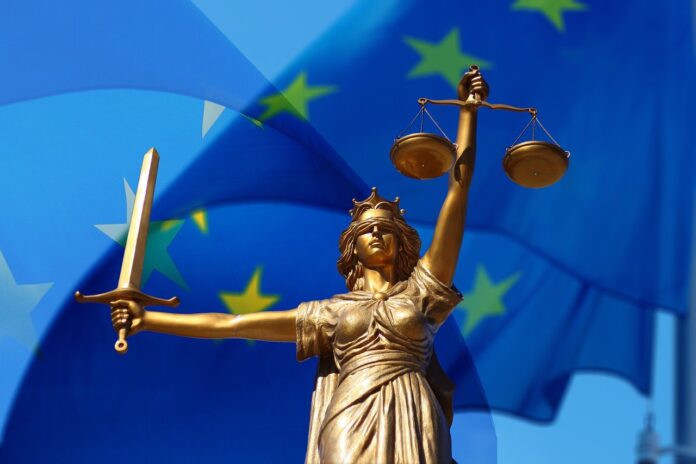At the Festschrift-Seminar for Prof. Dr. Dr. Mads Andenæs on 19 June 2025, the EFTA Court’s long time President, Carl Baudenbacher, gave the following speech, at the University of Oslo. Prof. Dr Dr h.c. Carl Baudenbacher acted as the Court’s President from 2003 until 2017 and is currently a Partner at Baudenbacher Law AG, a Door Tenant at Monckton Chambers, London, Visiting Professor at the LSE and Full Professor Emeritus, University of St. Gallen (Switzerland).
When I joined the EFTA Court, I was among the youngest members of the European judiciary. I am not young anymore today.
Still, I have the privilege of working with younger colleagues — and learning from them.
I have been advised to speak less in terms of what I believe is right and instead ask more questions.
That is what I intend to do today.
My wife Doris kindly accompanied me to Oslo. She has a PhD in economics, and I can say that everything I know about law and economics, I learned from her.
Let me then convey the greetings of the President of the Swiss Competition Commission, Dr Laura Melusine Baudenbacher, who happens to be our daughter.
My first remarks are dedicated to
I. Mads the Smeller or Diviner
Growing up in a small Swiss town, I was fascinated by the craft of water diviners: people who, even today, are consulted to locate underground water sources.
Each has their own technique: some use their hands, others a divining rod.
Mads Andenæs is, in a metaphorical sense, a legal diviner (ein juristischer “Wünschelrutengänger”). His breadth of knowledge spans numerous legal systems, but his real gift lies in identifying the essential issue, the heart of a case, without knowing the details.
That rare instinct makes him one of the truly distinguished lawyers of our time.
Yes, I may be biased.
Admiration and friendship often go hand in hand.
But even from a distance, few would dispute what Mads has achieved: he has carried the name of his native Norway into the heart of the global legal community — with intellect, integrity and no small amount of Norwegian tenacity.
My second point concerns
II. The Concept of Political Justice
To a certain extent, justice has always been and will always be political.
But the term “political justice” refers to something else.
It refers to the instrumental use of judicial proceedings to gain, retain, expand, or restrict political power or influence.
Today, we are witnessing an increasingly intense struggle over the allocation of limited resources.
Migration poses complex legal and societal challenges.
Ideological trends, including elements of cultural activism, can sometimes adopt a combative stance.
In many European countries, long-standing red-green political coalitions have shifted the legal climate. They are increasingly being opposed by conservative forces.
The result is in my view a more polarised, more politicised judicial landscape.
In legal methodology, the prevailing
III. Post-WW II Approach
can only be understood against the background of what had happened in the Third Reich.
Law and legal methodology had been perverted. The late German professor Bernd Rüthers, a friend of mine, showed in his 1968 habilitation (postdoctoral) thesis entitled “The Unlimited Interpretation” (“Die unbegrenzte Auslegung”) how civil law, outwardly untouched, was reinterpreted through a construction of general clauses such as good faith, morality, or public order in light of NS ideas.
The contract with the Jew, for example, was suddenly declared immoral.
The murders of June 30, 1934, were justified by Carl Schmitt in an essay entitled “Der Führer schützt das Recht” (“The Führer Protects the Law) in the Deutsche Juristenzeitung.
After 1945, a central tenet of legal methodology in Europe was the return to the separation of powers, a corrective response to both the “unlimited interpretation” and the “Führer’s Order” of National Socialism.
The traditional canons of interpretation, text, historical context, legislative purpose, systematic position, and constitutional considerations, regained primacy.
Admittedly, the CJEU showed an early preference for “effet utile”, i.e. dynamic interpretation. And the European Court of Human Rights described the ECHR as a ‘living instrument which must be interpreted in the light of present-day conditions’.
But there was never a rigid hierarchy among these canons.
However, recent developments suggest a renewed departure from the interpretive balance.
I will illustrate this shift through
IV. Five Cases which should Make us Think
The first case concerns the most famous Swiss students fraternity. I disclose that a was a member of them, and they still list me as a senior member (einen “Alten Herrn”).
- Swiss Federal Supreme Court Zofingia
In a unanimous ruling, Switzerland’s highest court has on 5 May 2025 barred all-male student fraternities from university campuses, overturning established precedent. The Court decides such cases in a five-judges formation.
This decision prioritises equal treatment over freedom of association.
Zofingia, the fraternity concerned, is the oldest and most symbolic one of these associations. It played a key role in the liberal revolution of 1847/48 and the formation of Switzerland’s Federal Constitution.
Its historic contributions are widely recognized.
Countless Government Ministers as well as the arguably most popular Swiss of the last 100 years, WW II General Henri Guisan, were “Zofinger”.
Ironically, Switzerland’s most famous university, the Swiss Institute of Technology in Zurich, was founded by Zofinger. And its second branch in Lausanne was the location where the events of the case took place.
So you could say that without Zofingia, there would be no Institute of Technology in Lausanne and therefore no such case.
How did the Supreme Court come to its result?
It refrained from applying the full canons of interpretation.
It relied instead on unverified claims, such as the assumption that fraternity membership advances careers.
The question poses itself:
Are we witnessing a politicised judiciary overriding legal principles?
And what are the broader implications?
– Will the Masonic Grand Lodge Alpina, all-male since 1844, be required to admit women?
– Will Catholic parishes be legally compelled to ordain female priests?
– Will mosques be obligated to appoint women as imams?
My second case is
- CJEU: Commission v. Malta
On 29 April 2025, the CJEU’s Grand Chamber ruled Malta’s investment-based citizenship scheme unlawful.
The Court
- sidestepped its own interpretive canon,
- ignored the Advocate General’s opinion,
- and failed to engage with unanimous academic literature.
The judgment came as a surprise. No EU Member State (with the exception of Malta as a defendant) had participated in the proceedings.
Granting citizenship is a core element of statehood. The legal basis for the Court’s ruling remains elusive.
I promised to ask questions.
My main question is:
Are we faced with an ultra vires judgment?
And: Has the CJEU been unable to resist the temptation to interfere with the rights of Member States to decide on their citizenship?
Moreover, the Court drew selectively on international law-
It indirectly referenced the 1955 Nottebohm judgment of the ICJ.
In that case, the ICJ claimed that a “genuine link” between the state and the citizen had to be established.
Mads has said everything that needs to be said regarding Nottebohm many years ago.
The judgment was directed against a German national who had moved to Guatemala long before WW II and acquired Liechtenstein citizenship after the beginning on the War.
There were three dissenters, among them the judges from Norway, Helge Klæstad, and from Switzerland, Paul Guggenheim.
They saw it right.
Mads was one of the few who called a spade a spade. In this case we must speak of victors justice.
All in all, the Grand Chambers’ judgment appears ideologically driven, echoing the von der Leyen Commission’s emotional rhetoric.
The ruling is economically questionable and inconsistent:
EU member states routinely grant passports under far less stringent criteria to enormous numbers of people who are a burden on society.
In 2023, resource-poor Malta naturalized 53 persons based on its citizenship by investment program.
The CJEU’s judgment raises uncomfortable questions about double standards and perhaps about envy, a well-known European sentiment.
My third case concerns
- Norway: Høyesterett NAV Scandal
Borgarting Court of Appeal denied compensation to potentially tens of thousands of victims of NAV’s unlawful actions in a pilot case. The welfare authority had made the payment of benefits conditional on the physical presence of the beneficiaries on Norwegian soil. This violated the freedom to receive services under the EEA Agreement. The State had not been able to deny NAV’s decades of wrongdoing. But both Oslo Tingrett and Borgarting Lagmannsrett followed the State’s claim of lack of culpability despite overwhelming evidence to the contrary.
In April 2025, the Supreme Court rejected the appeal, following the position of the State Attorney (Regjeringsadvokaten).
The decision to throw out the case was rendered by three former bureaucrats turned judges who formed the Appeals Committee.
This raises concerns about institutional bias.
The Supeme Court also refused to send the matter to the EFTA Court, without reasons.
Referring to EFTA Court E-18/11 Irish Bank and E-3/12 Jonsson, I would ask the question whether this is compatible with Article 6 ECHR.
That important court decisions must be reasoned already follows from natural justice.
I disclose that my law firm represents the victims of the NAV scandal before the European Court of Human Rights.
Example number four:
- Germany: Federal Constitutional Court “Emergency Brake”
In 2021, the German Bundesverfassungsgericht upheld sweeping pandemic measures, curfews, vaccine mandates, and protest bans, without serious scrutiny.
Before the ruling in the “emergency brake (curfew)” case, Chancellor Angela Merkel hosted a dinner with all federal ministers and the entire Constitutional Court.
What was the topic? “Decision-making in uncertain times”, suggested by the Court’s President.
A motion for recusal was rejected.
Renowned Journalist Fatina Keilani dryly noted: “Only one party can count on the Constitutional Court — the Federal Government.”
Constitutional Court President Stephan Harbarth, a prominent former CDU MP and business lawyer with little academic distinction, openly promotes an opaque model of “cooperative separation of powers” rather than classical liberal checks and balances.
It’s no more 1945, it’s the 2020’s.
Mr. Harbarth’s public rhetoric toward dissenters borders on the archaic. In his view, dissenters are essentially troublemakers who weaken the persuasiveness of the judgment.
Should that not raise alarm?
Fifth and last case is
- ECtHR: Climate Seniors v. Switzerland
A group of elderly Swiss women successfully brought a climate case before the ECtHR.
In its judgment of 9 April 2024, the Court created both (1) a novel human right and (2) an equally novel right of standing — enabling a result-driven outcome.
The Court granted locus standi to organisations aligned with its own agenda.
The case was backed and financed by Greenpeace.
The legal foundation is tenuous. Climate litigation, in essence, falls under tort law and causality is notoriously difficult to prove. (Thats perhaps one point where I disagree with Mads. Or maybe he does agree with me after all.)
Meanwhile, resistance against the Court is growing among Council of Europe Member States, recently also regarding migration rulings.
Switzerland has refused the implementation of Climate Seniors, and seven states, led by Denmark and Italy criticized the migration case law.
The question poses itself: Is the Court risking its own legitimacy by overreaching?
I don’t want to be misunderstood here. I am not an originalist in the sense of the late US Supreme Court Justice Antonin Scalia.
Of course, an international or supranational court may go beyond what the member states have agreed.
But it must ensure that these states follow it in principle.
The scissors must not open too wide.
“The Strasbourg Human Rights Court has contributed to asylum chaos” – Former Belgian Constitutional Court President https://t.co/wyiWCw36q6 @NewsEchr #ECHR #migration #asylum
— BrusselsReport.EU (@brussels_report) June 5, 2025
So, what are the
V. Countermeasures?
- Behavioural Safeguards
Ethical rules for judges have limited effect.
However, one crucial obligation remains: value judgments must be made transparent.
In particular high courts must disclose the true rationale behind their decisions, especially when overturning precedent.
They should also adopt common law techniques such as distinguishing to ensure clarity and continuity.
The CJEU, in particular, has room for improvement in this regard.
Without transparency, there can be no trust.
More promising are
- Structural mesures
- Judicial Appointments: Should judges serve for fixed terms or for life? Both systems have their advantages and disasvantages.
- Open Vote and Dissenting Opinions: Transparency and accountability demand both. Citizens and businesses deserve to know how individual judges adjudicate.
- Limiting Government Influence: This is a critical issue, especially in Norway where bureaucrats have best chances to be appointed to the courts.
- Quality Test: Public hearings for Supreme Court nominees should become the norm.
VI. If the law is to remain a river, clear, navigable, and just, we must ensure it is not poisoned at its source
And for that, we need more Madses.
More legal diviners.
More people without fear, but with a strong spine.
And fewer robes that echo only power.
Thank you.
Prof. Dr Dr h.c. Carl Baudenbacher
Disclaimer: www.BrusselsReport.eu will under no circumstance be held legally responsible or liable for the content of any article appearing on the website, as only the author of an article is legally responsible for that, also in accordance with the terms of use.













